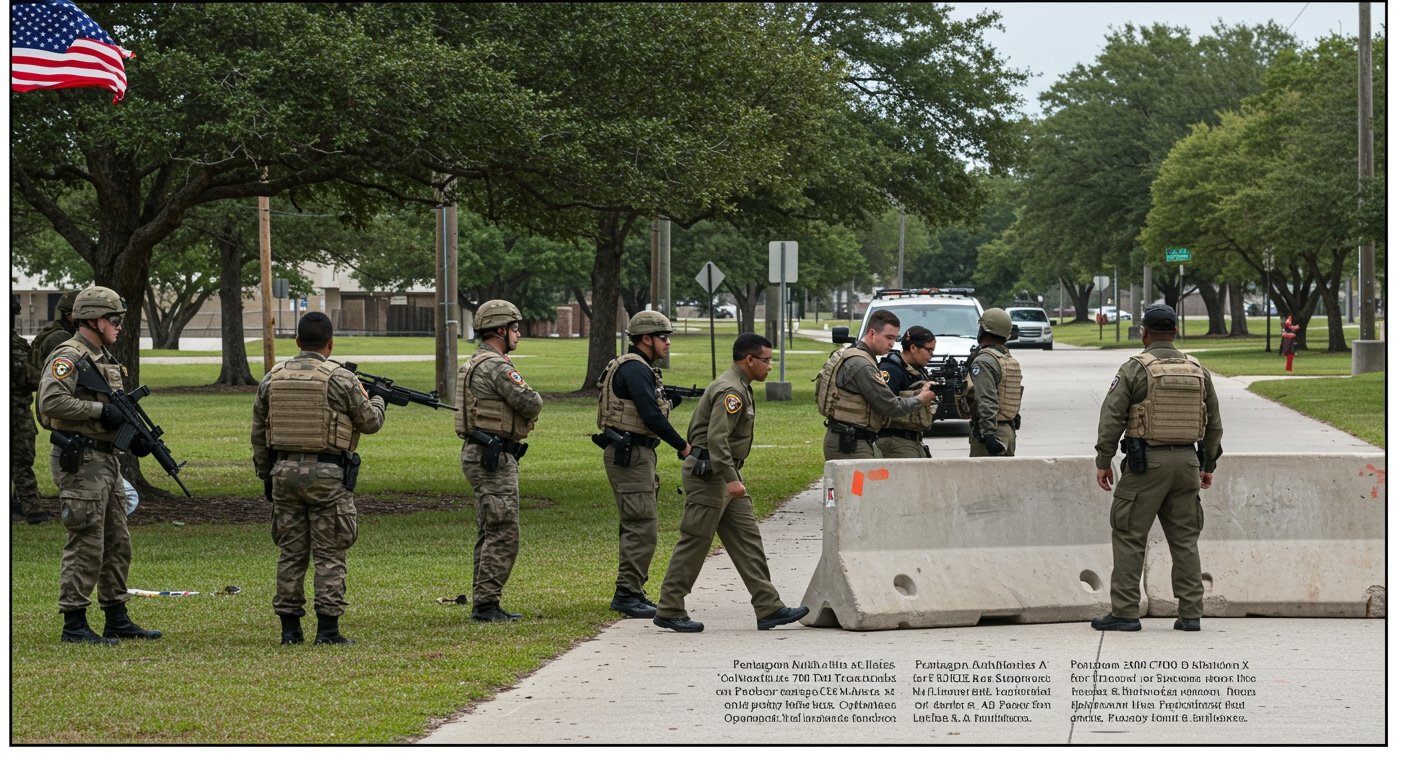Washington D.C. — The United States Department of Defense (DoD) announced Tuesday its authorization to deploy up to 700 active-duty military personnel to provide support for U.S. Immigration and Customs Enforcement (ICE) operations across three states: Florida, Texas, and Louisiana.
This move comes as federal agencies continue to manage various aspects of immigration enforcement and processing. The authorized personnel are slated to provide essential logistical, administrative, and clerical functions. Crucially, the DoD stipulation emphasizes that these troops will not directly participate in law enforcement activities, such as arrests or border patrol operations. Their role is strictly defined as support, aimed at enabling ICE agents to focus on their primary enforcement duties.
Scope of the Deployment
The deployment will see varying numbers of service members assigned to each state based on operational needs. According to the announcement, up to 200 service members are authorized for assignment to Florida. A similar contingent, up to 200 personnel, is designated for deployment to Louisiana. The largest portion of the authorized force, up to 300 troops, is intended for Texas, a state with an extensive border and significant immigration activity.
The specific locations within these states where the troops will be stationed were not immediately detailed, but their support roles suggest placement at facilities or command centers where administrative and logistical assistance is required by ICE.
The Nature of Military Support for Civilian Agencies
The deployment of military personnel to assist civilian law enforcement or federal agencies is a measure taken under specific authorities, often invoked to provide support during times of high operational demand or in situations requiring large-scale logistical coordination. In this instance, the DoD personnel are tasked with duties that are distinct from typical law enforcement functions, focusing instead on the support infrastructure necessary for ICE operations.
These support roles can include tasks such as data entry, managing supplies, transportation coordination, or other administrative duties that alleviate the workload on ICE officers. This allows ICE personnel to be deployed more effectively in roles requiring their specific training and authority.
Political Reactions and Context
The announcement has drawn swift reactions from political figures, highlighting the often contentious nature of federal immigration policy and enforcement.
U.S. Representative Maxwell Frost, a Democrat representing Florida, was critical of the decision. Representative Frost voiced strong opposition, stating that he believes the administration “want to terrorize our communities” with such deployments. This viewpoint reflects concerns often raised by opponents of increased enforcement measures, who argue that they can create fear and instability within immigrant communities, regardless of legal status.
Conversely, Florida Governor Ron DeSantis, a Republican, has publicly taken a firm stance supporting federal ICE efforts. Governor DeSantis’s position aligns with a broader political perspective advocating for robust immigration enforcement and border security. While his direct comment on this specific DoD authorization was not provided in the initial summary, his general stance indicates likely approval or support for measures that bolster federal immigration operations within his state and elsewhere.
Understanding ICE’s Role
U.S. Immigration and Customs Enforcement (ICE) is a federal law enforcement agency under the U.S. Department of Homeland Security. Its primary mission is enforcing immigration laws, including investigating financial and other illicit activities of transnational criminal organizations, and preventing terrorism and illegal movement of people and goods. ICE officers conduct interior immigration enforcement, which involves identifying, locating, and apprehending undocumented immigrants within the United States. The support from DoD personnel aims to enhance ICE’s capacity to carry out these functions by handling ancillary tasks.
Implications of the Deployment
The deployment marks another instance where the U.S. military is utilized in a supporting role for domestic operations related to border security and immigration enforcement. While not unprecedented, such deployments often spark debate regarding the appropriate use of military resources and personnel in civilian matters.
The authorized deployment of up to 700 troops signifies a significant commitment of resources to assist ICE in its operations in these key states. The effectiveness of this support will likely be measured by the extent to which it enhances ICE’s operational efficiency and allows the agency to reallocate its own personnel to enforcement tasks.
As the deployment proceeds, observers will be watching how the military personnel integrate with ICE operations and whether the support yields the intended results. The differing political responses underscore the ongoing national conversation surrounding immigration policy and the methods used to enforce federal law.





